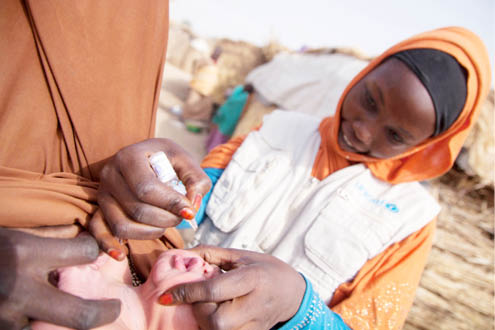Relapse in immunization brings pandemic perils
In the last week of every April, the world tries to remind itself the importance of vaccines—one of the greatest inventions in health ever. The move is to promote the use of vaccines to protect people of all ages against disease. But the world also worries that a growing number of people are missing out—not […]

In the last week of every April, the world tries to remind itself the importance of vaccines—one of the greatest inventions in health ever.
The move is to promote the use of vaccines to protect people of all ages against disease.
But the world also worries that a growing number of people are missing out—not vaccinated—and pose threat of diseases resurging.
Between 2010 and 2017, an estimated 169 million children missed out on the first dose of measles vaccine, according to data from the World Health Organisation and the United Nations Children’s Fund. That’s around 21.1 million children not vaccinated every year on average.
In the case of measles, widening pockets of unvaccinated children have created a pathway to the measles outbreak hitting several countries around the world of recent.
In the first three months of this year, more than 110,000 cases of measles were reported worldwide, a 300% rise from the same period last year.
In 2017, an estimated 110,000 people, mostly children, died from measles—a 22% increase from 2016.
“The ground for the global measles outbreaks we are witnessing today was laid years ago,” said Henrietta Fore, UNICEF executive director.
“The measles virus will always find unvaccinated children. If we are serious about averting the spread of this dangerous but preventable disease, we need to vaccinate every child, in rich and poor countries alike.”
In 2017, nearly 4 million children under one year of age in Nigeria missed out on the first dose of measles vaccine—the highest in the world. India, Pakistan and Indonesia follow in that order.
Nigeria’s situation is interesting because of a history of vaccine rejection with regards to polio. The country is in its final days of countdown to polio eradication, and all interventions and programmes put in place to end polio are firing on. But polio is only one of a handful of diseases that children should be immunized against in the first nine months of life.
Experts in public health are pushing a narrative: immunization is the way to end epidemics.
“We all have our roles, both government and citizens,” says Chika Offor, of the Vaccine Network.
“But everything drills down to the community. If we get it right as a community, then we’ll get it right. If we come together, as a team, not complaining, we’ll be amazed at the success we’ achieve.”
The narrative also emphasizes the one-health approach to diseases, the notion that a disease or an outbreak isn’t solely a health-sector problem but extends to agriculture, environment, water, travel.
But a crucial in outbreak management starts even before the outbreak: data.
“We need to keep using the data, the information we have to let people know the problems we are having,” says virologist Oyewale Tomori, who chairs an expert review committee on polio eradication.
“Consider the surge of Lassa fever last year. It wasn’t that we weren’t having it but it suddenly surged. If we had not been taking information about what was going on before, we wouldn’t have know last year was worse than previous years.”
But there is a growing divide that public-health experts worry about: messaging the urban elites. With posters and billboards pervading cities, and jingles hitting airwaves in urban areas, it is expected the urban elites know what’s up. The uncomfortable discovery is they don’t.
“The elites are also guilty of us getting the message right. We think we know, but we don’t,” says Elsie Ilori, team lead for a technical working group on Lassa fever at the Nigeria Centre for Disease Control.
“We are all part of the community. It should start with us.”
When she had her first baby in the UK, her infant wasn’t offered any vaccine until she deliberately asked for it.
The anti-vaccine movement, pushing the notion that opting to refuse vaccination is a basic right, is getting noisier. Many in developed countries have relapsed on pushing immunization programmes. Individuals have opted not be vaccinated on the grounds that they are fine.
But a concern for public health is that all it takes for an outbreak sometimes is just one unvaccinated person shattering the herd immunity of a population.
The US leads a list of 10 high-income countries with children missing out on the first dose of measles vaccine between 2010 and 2017—an estimated 2.5 million children. Following on the list are France, the UK, Argentina, Italy, Japan, Canada, Germany, Australia and Chile.
“The elites are one of those we need to work on. Most don’t understand why they should immunize their children. So we need to target the message,” says Ilori.
“We are already trying to make sure people are accepting immunization. The activity is ongoing. We have not broken the trend. [The outbreak] is a lesson for us to know that we should not relapse.”
